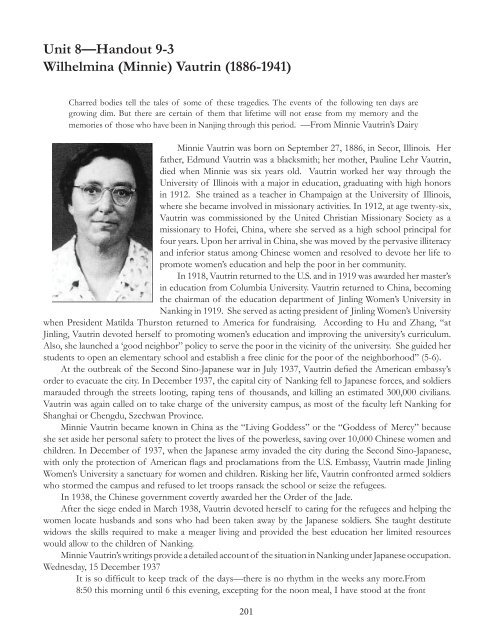Download - Canada ALPHA
Download - Canada ALPHA
Download - Canada ALPHA
Create successful ePaper yourself
Turn your PDF publications into a flip-book with our unique Google optimized e-Paper software.
Unit 8—Handout 9-3<br />
Wilhelmina (Minnie) Vautrin (1886-1941)<br />
Charred bodies tell the tales of some of these tragedies. The events of the following ten days are<br />
growing dim. But there are certain of them that lifetime will not erase from my memory and the<br />
memories of those who have been in Nanjing through this period. —From Minnie Vautrin’s Dairy<br />
Minnie Vautrin was born on September 27, 1886, in Secor, Illinois. Her<br />
father, Edmund Vautrin was a blacksmith; her mother, Pauline Lehr Vautrin,<br />
died when Minnie was six years old. Vautrin worked her way through the<br />
University of Illinois with a major in education, graduating with high honors<br />
in 1912. She trained as a teacher in Champaign at the University of Illinois,<br />
where she became involved in missionary activities. In 1912, at age twenty-six,<br />
Vautrin was commissioned by the United Christian Missionary Society as a<br />
missionary to Hofei, China, where she served as a high school principal for<br />
four years. Upon her arrival in China, she was moved by the pervasive illiteracy<br />
and inferior status among Chinese women and resolved to devote her life to<br />
promote women’s education and help the poor in her community.<br />
In 1918, Vautrin returned to the U.S. and in 1919 was awarded her master’s<br />
in education from Columbia University. Vautrin returned to China, becoming<br />
the chairman of the education department of Jinling Women’s University in<br />
Nanking in 1919. She served as acting president of Jinling Women’s University<br />
when President Matilda Thurston returned to America for fundraising. According to Hu and Zhang, “at<br />
Jinling, Vautrin devoted herself to promoting women’s education and improving the university’s curriculum.<br />
Also, she launched a ‘good neighbor” policy to serve the poor in the vicinity of the university. She guided her<br />
students to open an elementary school and establish a free clinic for the poor of the neighborhood” (5-6).<br />
At the outbreak of the Second Sino-Japanese war in July 1937, Vautrin defi ed the American embassy’s<br />
order to evacuate the city. In December 1937, the capital city of Nanking fell to Japanese forces, and soldiers<br />
marauded through the streets looting, raping tens of thousands, and killing an estimated 300,000 civilians.<br />
Vautrin was again called on to take charge of the university campus, as most of the faculty left Nanking for<br />
Shanghai or Chengdu, Szechwan Province.<br />
Minnie Vautrin became known in China as the “Living Goddess” or the “Goddess of Mercy” because<br />
she set aside her personal safety to protect the lives of the powerless, saving over 10,000 Chinese women and<br />
children. In December of 1937, when the Japanese army invaded the city during the Second Sino-Japanese,<br />
with only the protection of American fl ags and proclamations from the U.S. Embassy, Vautrin made Jinling<br />
Women’s University a sanctuary for women and children. Risking her life, Vautrin confronted armed soldiers<br />
who stormed the campus and refused to let troops ransack the school or seize the refugees.<br />
In 1938, the Chinese government covertly awarded her the Order of the Jade.<br />
After the siege ended in March 1938, Vautrin devoted herself to caring for the refugees and helping the<br />
women locate husbands and sons who had been taken away by the Japanese soldiers. She taught destitute<br />
widows the skills required to make a meager living and provided the best education her limited resources<br />
would allow to the children of Nanking.<br />
Minnie Vautrin’s writings provide a detailed account of the situation in Nanking under Japanese occupation.<br />
Wednesday, 15 December 1937<br />
It is so diffi cult to keep track of the days—there is no rhythm in the weeks any more.From<br />
8:50 this morning until 6 this evening, excepting for the noon meal, I have stood at the front<br />
201


